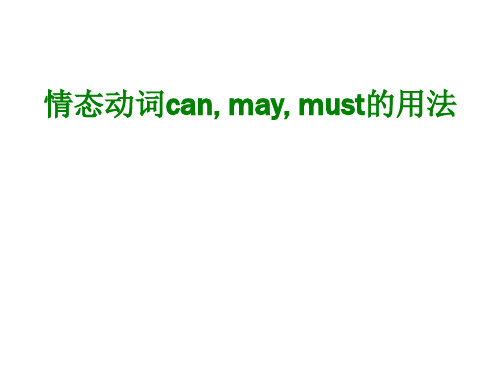情态动词can need must的用法
- 格式:pptx
- 大小:176.47 KB
- 文档页数:9


英语情态动词can、may、must的用法摘要情态动词是一类表示说话人对动作或状态的看法或主观设想的词,它们不能独立作谓语,只能和动词原形一起构成谓语。
英语中主要的情态动词有can (could), may (might), must, have to, need, shall (should), ought to, dare (dared), will (would)等。
本文主要介绍其中三个常用的情态动词:can、may和must,它们可以表示许可、能力、可能性、推测、义务、责任等不同的语气。
本文将通过表格和例句来说明它们在不同语境中的含义和用法,并指出它们之间的相似点和区别点。
一、can和could1. 表示许可can和could都可以表示请求或给予许可,但是could比can更委婉,更礼貌。
情景例句请求许可Can I borrow your pen? 我可以借你的笔吗?Could I use your phone? 我可以用一下你的电话吗?给予许可You can take my bike. 你可以骑我的自行车。
You could have some cake. 你可以吃一些蛋糕。
2. 表示能力can和could都可以表示某人有某种能力,尤其是生来具备的能力或通过学习获得的能力。
但是could是can的过去时,通常只用于表示过去一般性能力,而不表示过去具体某次特定情形下能够做某事的能力。
情景例句表示现在或一般性能力She can speak three languages. 她会说三种语言。
He can run very fast. 他跑得很快。
表示过去一般性能力When I was young, I could swim across the river. 我年轻时,能游过河。
She could play the piano when she was five. 她五岁时就会弹钢琴。
3. 表示可能性或推测can和could都可以表示对现在或将来某事发生的可能性或推测,但是could比can表示可能性更小,更不确定。

may must can need的用法
1. May:可以用作情态动词,表示“可能会”或“也许”。
“May”通常用于猜测未来的情况或做对某件事的提议。
例如,“It may rain tomorrow”(明天可能会下雨),“May I ask you a question?”
(我可以问你一个问题吗?)
2. Must:可以用作情态动词,表示“必须”。
“Must”通常用于
强调事实或做出命令或警告。
例如,“You must wear a mask in public”(你必须要在公共场合戴口罩),“I must finish this report by tomorrow”(我必须在明天之前完成这份报告)。
3. Can:可以用作情态动词,表示“能够”,“可以”。
“Can”
通常表示能力或许可性。
例如,“I can play the piano”(我会弹
钢琴),“Can I come to the party?”(我可以来参加聚会吗?)
4. Need:可以用作情态动词或动词,表示“需要”。
“Need”作
为情态动词时表示“必须”,与“must”用法相似。
例如,“You
need to finish your homework before you can play”(你必须完
成作业才能玩耍)。
作为动词时,通常表示真正的需求。
例如,“I need help with this project”(我需要帮助完成这个项目)。
![[need的用法]can、may、must、need的用法](https://img.taocdn.com/s1/m/7c3e1b0ba200a6c30c22590102020740be1ecd3c.png)
[need的用法]can、may、must、need的用法篇一: can、may、must、need的用法can、may、must、need的用法can①表示能力,“能,会”。
[)Eg : Can you play basketball?②表示怀疑,猜测,常用于否定句或疑问句。
Eg :Li hua can’t be in the classroom.③表示请求,允许,多用于口语,译“可以”= may.Eg: you can go now.④can 开头的疑问句,肯定句,否定句用can或can’t.may①表示推测,“可能,也许”,用于肯定句。
Eg: He may come tomorrow.②表示请求,“许可,可以”。
Eg:May I borrow your book?注:表示请求,许可时,主语为第一人称的一般疑问句,否定回答用mustn’t“不可以,禁止,不许”,不用may not“可能不”。
③表示祝愿。
Eg :May you success.must①表示“必须,应该”。
②表示推测“一定”。
Eg:There is someone knocking at the door.It must be Jim.③否定句中,mustn’t 表示禁止,“不允许”。
④以must 开头的疑问句,肯定句回答用must,否定回答用needn’t , 表示“不需要,不必”=“don’t have to”.⑤表示“偏偏”。
Eg: Must you play the piano at this time.need①情态动词:+do,用need 提问或回答,肯定句回答用must ,否定句回答用needn’t.Eg: Y ou needn’t come to school so early.②实义动词:+to do ,用助动词提问和否定。
③+doing 表示被动。
④needn’t have done 表示没必要做某事但是做了。


初二英语上册情态动词can、may、must用法归纳1. can 的用法:(1)表示能力、许可、可能性。
表示能力时一般译为“能、会”,即有种能力,尤其是生来具备的能力.如:She can swim fast, but I can’t . 她能游得很快,但我不能。
I can see with my eyes. 我用眼睛看。
could是can的过去式。
表示过去的能力。
be able to do sth. 常常指经过努力,花费了时间和劳力之后才能做到某事。
is/am/are able to do sth was/were able to do sth.(2)表示许可,常在口语中。
如:You can use my dictionary. 你可以用我的字典。
(3)表示推测,可能性,意为“可能”,常用于否定句和疑问句中,此时can’t 译为“ 不可能”。
如:Can the news be true? 这个消息会是真的吗?—Can it be our teacher?那个人有可能是我们老师吗?—No, it can’t be our teacher. He is on a visit to the Great Wall.不可能。
咱们老师正在游览长城呢。
【例题】—I think Miss Gao must be in the library. She said shewould go there. —No. She __be there, I have just been there.A.can’tB.mustn’tC.needn’tD.wouldn’t【解析】根据下文“我刚去过那儿”可知,应为“ 不可能”,can’t 表示推测。
[答案] Acould的用法:(1)can的过去式,意为“ 能、会”,表示过去的能力。
如:He could write poems when he was 10. 他十岁时就会写诗。
(2)could在疑问句中,表示委婉的语气,此时could 没有过去式的意思。
情态动词的用法与考点情态动词包括:can, could, may, might, will, would, shall, should, must, need情态动词的基本用法:1.情态动词后必须跟行为动词原形.2.情态动词在变疑问句时可以直接提前.3.情态动词的否定形式是在情态动词后面直接加not.用法与考点:1. 表示能力--can, couldcan表示能力,相当于be able to,在过去时态中用could.eg: I can / am able to dive.I could / was able to dive when I was ten years old.2. 表示请求允许--can, could, may, 在使用时要注意它们的回答eg: --can I go out now?--yes, you can./ no, you can't.--Could I go out now?--yes, you can./ no, you can't.--may I go out now?--yes, you may./ no, you can't.注意:三种请求允许的否定回答形式都可以用no, you can't. / no, you mustn't. / no, you'd better not.3. 表示推测--can, could, may, might, must,但是其所表示的可能性大小不同。
& may, might 用来表示没有根据的猜测,表示事情的可能性不大,might 也可表达对过去发生的事情的猜测。
上下文中常有I have no idea. / I don't know. / I haven't decided yet. 等表示不确定因素的语言。
eg: He may/might go to the party with me tonight, but he haven't decided yet.He might go to the cinema last night.& can, could 表示有根据的推测,常常是根据生活常理可以推测出的事情。
八年级情态动词的用法一、can 的用法:(1) 表示能力。
表示能力时一般译为“能、会”,即有某种能力,尤其是生来具备的能力,此时may 和must 均不可代替它。
例如:He can swim fast, but I can’t. 她能游得很快,但我不能。
She can see with my eyes. 我用眼睛看。
(2) 表示许可,常在口语中。
例如:You can use my dictionary. 你可以用我的字典。
(3) 表示推测。
表示推测时,意为“可能”,常用于否定句和疑问句中,此时can’t 译为“不可能”。
例如:Can the news be true? 这个消息会是真的吗?— Can the man be our teacher?那个人有可能是我们老师吗?— No, he can’t be our teacher. Our teacher is on a visit to the Great Wall.不可能。
咱们老师正在游览长城呢。
二、could的用法:(1)can的过去式,意为“能、会”,表示过去的能力。
例如:He could write poems when he was 10. 他十岁时就会写诗。
(2)could在疑问句中,表示委婉的语气,此时could 没有过去式的意思。
例如:Could you do me a favour? 你能帮我个忙吗?— Could I use your ruler? 我能用一下你的钢笔吗?—Yes, you can.可以。
三、may的用法:(1) 表示请求、许可,比can 正式。
例如:May I borrow your book? 我可以借你的自行车吗?You may go home now. 现在你可以回家了。
(2) 表示推测,谈论可能性,意为“可能,或许”,一般用于肯定句中。
例如:It may rain tomorrow. 明天可能会下雨。
情态动词can, may, must与need的用法区别
Could you borrow your pen?
Yes,you
A.Could
B.Can
C.may
情态动词是表示说话人的某种感情或语气的动词,用来表示请求、允诺、愿望、建议、命令、能力、需求或拒绝等情感态度。
1、情态动词的共同点:
(1)情态动词有一定的词义,但不能单独做谓语,必须与实义动词或连系动词连用,构成谓语。
如:
You may take whatever you like.你可以带走你喜欢的任何东西。
(can是情态动词,而take是实义动词)
(2)情态动词一般无人称和数的变化,如:
He must give up smoking. 他必须戒烟。
(must是情态动词,没有第三人称单数一般现在的形式,即,不能加-s)
(3)情态动词后接动词原形。
如:
She may lose her way.她可能迷路了。
(may是情态动词,lose不能用loses, lost, losing等形式)
(4)情态动词具有助动词的作用,可用来构成否定句、疑问句及用于简略回答。
如:
Can you sing English songs?Yes, I can. (前面构成疑问句,后面作简略回答)2、May 的用法:。
初二英语上册情态动词can、may、must详细用法归纳与考点考点一:can,may,must 等情态动词在陈述句中的用法:1. can 的用法:(1)表示能力、许可、可能性。
表示能力时一般译为“能、会”,即有种能力,尤其是生来具备的能力.如:She can swim fast, but I can’t . 她能游得很快,但我不能。
I can see with my eyes. 我用眼睛看。
could是can的过去式。
表示过去的能力。
be able to do sth. 常常指经过努力,花费了时间和劳力之后才能做到某事。
is/am/are able to do sth was/were able to do sth.(2)表示许可,常在口语中。
如:You can use my dictionary. 你可以用我的字典。
(3)表示推测,可能性,意为“可能”,常用于否定句和疑问句中,此时can’t 译为“ 不可能”。
如:Can the news be true? 这个消息会是真的吗?—Can it be our teacher?那个人有可能是我们老师吗?—No, it can’t be our teacher. He is on a visit to the Great Wall.不可能。
咱们老师正在游览长城呢。
【例题】—I think Miss Gao must be in the library. She said she would go there. —No. She __be there, I have just been there.A.can’tB.mustn’tC.needn’tD.wouldn’t【解析】根据下文“我刚去过那儿”可知,应为“ 不可能”,can’t 表示推测。
[答案] Acould的用法:(1)can的过去式,意为“ 能、会”,表示过去的能力。
如:He could write poems when he was 10. 他十岁时就会写诗。